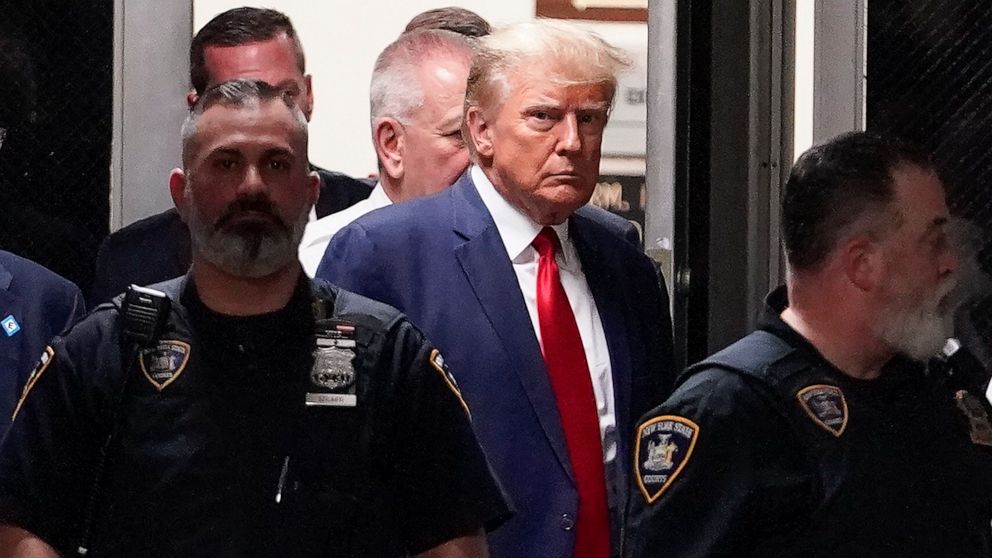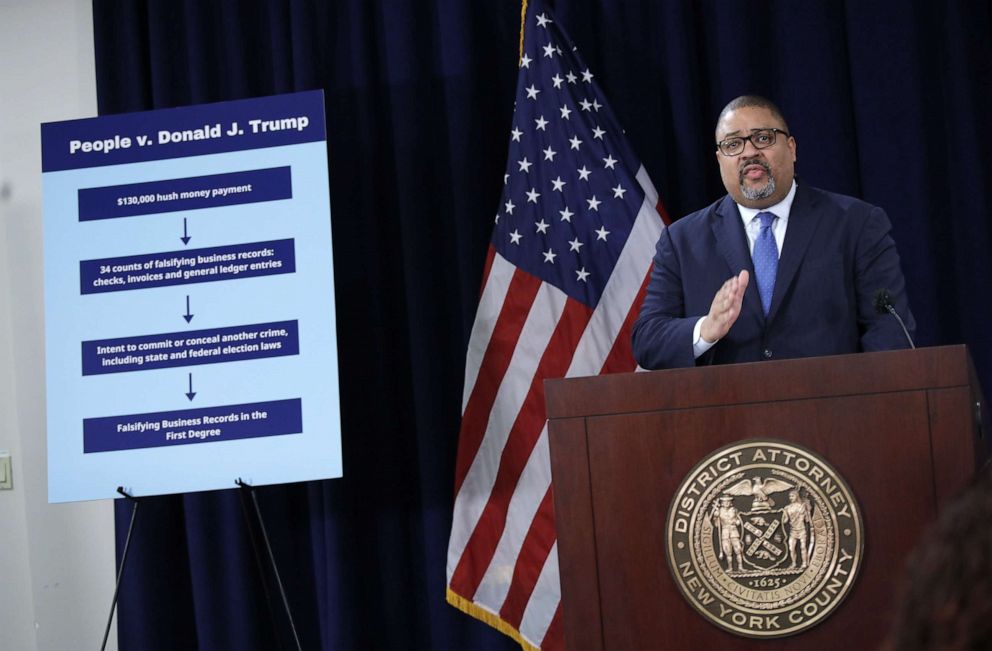Several legal experts familiar with the New York criminal justice system say there were "no surprises" in the charges brought against former President Donald Trump Tuesday by the Manhattan district attorney -- but that the expansive nature of the so-called "catch-and-kill" scheme alleged by prosecutors is notable.
Appearing in a Manhattan courtroom Tuesday, Trump entered a plea of not guilty to 34 felony counts of falsifying business records related to a hush money payment made in the final days of the 2016 presidential race.
Prosecutors allege that Trump engaged in a "scheme" to boost his 2016 election chances through a series of hush money payments made by others to help his campaign, and then "repeatedly and fraudulently falsified New York business records" to conceal that criminal conduct.
"The theory of the prosecution is exactly as we expected," Michael Bachner, former assistant district attorney in the Rackets Bureau of the Manhattan district attorney's office, told ABC News. "There was a scheme to bury stories through this catch and kill process in order to help Donald Trump get elected, and that these payments were in the campaign contributions which were improperly buried."
"The surprise here is that there were no surprises; at least no surprises that there was a more serious crime being charged," echoed Marc Scholl, who was a prosecutor in the Manhattan district attorney's office for nearly 40 years before entering private practice.
Prosecutors said the "catch and kill" efforts began in 2015 with an agreement with the CEO of National Enquirer publisher AMI to suppress damaging information, and included payments to Stormy Daniels and Karen McDougal, two women who claimed to have had long-denied affairs with Trump, as well as a former Trump Tower doorman who claimed to have a story about a child Trump had out of wedlock, which was untrue.
"Most people thought it was about Stormy Daniels," Jerry Saland, a former assistant district attorney in the Manhattan DA's office, told ABC News. "Here, however, we see it's also about McDougal, as well as a doorman."

Former President Donald Trump arrives at court, April 4, 2023, in New York.
Mary Altaffer/AP
Lance Fletcher, another former assistant district attorney at the Manhattan DA's office, said the alleged use of shell companies and recordings of conversations between Trump and his former attorney, Michael Cohen, appear to show that Trump was aware that the payments were "improper."
Fletcher, however said that prosecutors face a number of hurdles.
"Was Trump's intention truly to defraud or was he relying on bad legal advice? If the money came from his personal account, was this money used to solve a personal problem?" Fletcher asked.
Fletcher also said that the 16-page indictment "discusses an intent to defraud, and an intent to commit another crime, but does not specify what that other crime is."
"This is an important issue because the intent to defraud and intent to commit another crime is what bumps this up from a misdemeanor to a felony, and from a two-year statute of limitations to a five-year statute of limitations, also a one-year maximum jail sentence to a four-year sentence," he said.
Scholl agreed that neither the indictment nor the accompanying statement of facts released by prosecutors cites which specific election laws were violated -- even though the statement of facts talks at length about how the alleged catch and kill scheme was used to influence the 2016 election.
"The statement of facts document is an oddity," Scholl said, questioning why it was not part of the indictment as a conspiracy count. Scholl did, however, say that the district attorney doesn't have to prove anything that's in the statement of facts -- just what's in the indictment.
Asked by reporters following Trump's arraignment what other crimes Trump allegedly committed by falsifying the business records, Manhattan District Attorney Alvin Bragg said the indictment doesn't specify those details "because the law does not so require." But Bragg highlighted several laws he said are potentially applicable to the case, including New York state election law that makes it a crime to conspire to promote a candidacy by unlawful means; laws that prohibit false statements, including statements that were planned to be made to tax authorities; and federal election contribution limits.
Bachner said he expects Trump's defense team to file motions to dismiss the indictment, including by citing statutes of limitations and by claiming that the payments were made for personal purposes, with no intent to interfere with the election.
But Bachner and other legal experts say the timing of the payments -- as well as the timing of meetings related to the payments detailed in the prosecutors' statement of facts -- appear to show that the purpose was campaign-related and not for Trump's personal reasons.

Manhattan District Attorney Alvin Bragg speaks during a press conference, Apr. 4, 2023 in New York City.
Kena Betancur/Getty Images
Prosecutors, for example, said in the statement of facts that after Trump was elected, he invited the National Enquirer's owner to the White House for a dinner to "thank him for his help during the campaign."
"These illegal and undisclosed campaign expenditures undermined accountability and denied voters complete and accurate information about how Trump raised and spent money during the 2016 presidential election," said Saurav Ghosh, a former enforcement attorney at the Federal Election Commission and now director of Federal Campaign Finance Reform at the watchdog group Campaign Legal Center.
"While Trump, like any criminal defendant, is entitled to due process of law, it is vital that laws be enforced and that meaningful consequences be imposed when they are broken -- regardless of who the defendant is or how much power or influence they wield," Gosh said.
"about" - Google News
April 05, 2023 at 08:57AM
https://ift.tt/uVvcGOy
What legal experts say about Donald Trump's indictment - ABC News
"about" - Google News
https://ift.tt/Je7DkKa
Bagikan Berita Ini















0 Response to "What legal experts say about Donald Trump's indictment - ABC News"
Post a Comment